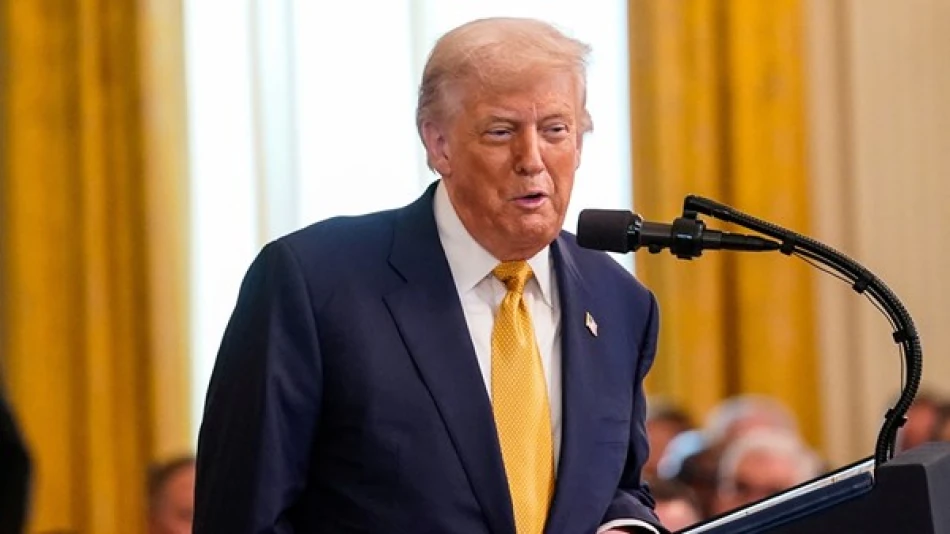
Former US President Trump Announces Trade Deal with Japan
Trump Claims "Massive" Japan Trade Deal While Tokyo Remains Silent on Details
President Donald Trump announced what he called a potentially record-breaking trade agreement with Japan, featuring 15% U.S. tariffs on Japanese goods and a promised $550 billion Japanese investment in America. However, Japanese Prime Minister Shigeru Ishiba has yet to confirm the deal's specifics, highlighting a familiar pattern of premature victory declarations that could complicate U.S.-Japan economic relations.
The Claimed Agreement: Heavy on Numbers, Light on Verification
Trump took to his Truth Social platform to declare the completion of a "massive deal with Japan, perhaps the biggest deal ever." According to his announcement, the agreement would require Japan to invest $550 billion in the United States under his direction, with America retaining 90% of the profits. The deal also reportedly includes 15% U.S. tariffs on Japanese imports.
The scale of the claimed investment dwarfs previous bilateral agreements. For context, Japan's total foreign direct investment stock in the U.S. stood at approximately $679 billion as of 2023, making Trump's announced figure represent a massive expansion of Japanese economic presence in America.
Tokyo's Cautious Response Raises Questions
Prime Minister Ishiba's measured response suggests either ongoing negotiations or disagreement over the deal's terms. Speaking to reporters in Tokyo, Ishiba stated he needed to "study the details of the agreement carefully" before commenting, adding only that any agreement should "protect national interests."
This diplomatic hedging contrasts sharply with Trump's definitive announcement, echoing similar disconnects during his first presidency when trade proclamations often preceded formal agreements.
Historical Context: Japan-U.S. Trade Tensions
The relationship carries significant historical baggage. During the 1980s and 1990s, Japan faced intense U.S. trade pressure, including voluntary export restraints and the Plaza Accord that dramatically strengthened the yen. Trump's first term saw similar tensions, with threats of auto tariffs forcing Japan into limited agricultural concessions in 2019.
Market and Economic Implications
If implemented as described, the deal would represent a fundamental shift in bilateral trade dynamics. The proposed 15% tariff rate sits between Trump's threatened 10-20% universal tariffs and his more punitive China-focused levies, suggesting Japan may have negotiated a middle ground.
For investors, the uncertainty creates immediate challenges. Japanese exporters like Toyota, Sony, and Nintendo could face significant margin pressure, while U.S. companies might benefit from reduced competition. However, the lack of confirmation from Tokyo makes any market positioning premature.
Comparison to Other Trade Relationships
Trump's approach mirrors his strategy with other allies-turned-trade-targets. South Korea faced similar pressure in 2018, ultimately agreeing to revised terms for the Korea-U.S. Free Trade Agreement. The European Union, meanwhile, has largely resisted comprehensive renegotiation, suggesting Japan's response will signal its broader trade strategy.
Strategic Calculations Behind the Announcement
Trump's public declaration before Japanese confirmation serves multiple purposes. It applies pressure on Tokyo to accept terms they might otherwise resist, while demonstrating early action on campaign promises to his domestic base. The timing also coincides with broader U.S. efforts to reduce dependence on Chinese manufacturing, making Japanese investment particularly valuable.
For Japan, the calculation involves balancing economic costs against strategic benefits. Deeper U.S. integration could provide security advantages amid regional tensions with China and North Korea, potentially justifying short-term economic concessions.
What This Means for Global Trade
The Japan announcement, confirmed or not, signals Trump's intention to renegotiate existing trade relationships through tariff leverage. This approach could reshape global supply chains as companies seek to avoid punitive duties through strategic relocations and partnerships.
The ultimate success of this strategy will depend on whether major economies like Japan accept new terms or seek alternative arrangements, potentially accelerating the fragmentation of global trade into competing blocs.
Most Viewed News

 Layla Al Mansoori
Layla Al Mansoori






